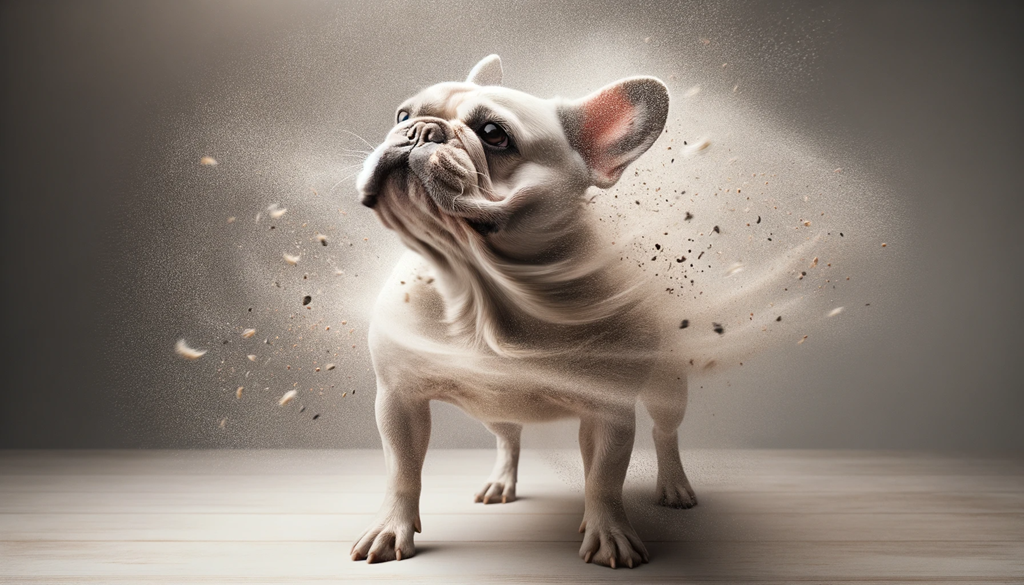Are French Bulldogs Hypoallergenic? You’re sneezing, eyes watering, but you’re desperate for a dog. Could French Bulldogs be your hypoallergenic hero? Unfortunately not. Let’s dive into the world of this popular breed. We’ll explore their allergenic potential and ways to manage it. Don’t let allergies stop you from pet ownership. Read on, and let’s discover the truth together.
Understanding Hypoallergenic Dogs
Before you delve into the specifics of French Bulldogs, it’s crucial for you to understand that no dog breed is 100% hypoallergenic. Hypoallergenic dogs, as they are commonly referred to, are breeds that are less likely to trigger allergy symptoms in people who are sensitive to pet dander. However, these breeds do not guarantee a completely allergy-free environment.
Not all dog breeds are created equal when it comes to their potential allergenicity. Some breeds shed less fur and skin cells, known as dander, which is the primary cause of pet allergies. Hypoallergenic dogs, such as the Poodle or the Bichon Frise, are known for their low-shedding coats, which can reduce the amount of dander in your home and lessen your allergy symptoms.
However, it’s important to remember that individual reactions to different dog breeds can vary greatly. You might be more allergic to one breed compared to another, or you might not even react to some breeds at all. It’s also worth noting that other factors, like a dog’s diet, its environment, and the amount of time it spends indoors, can all influence the severity of your allergy symptoms.
French Bulldogs: A Breed Overview
Moving on from the general overview of hypoallergenic dogs, let’s delve into the specifics of French Bulldogs, a popular breed known for their distinctive bat ears and compact bodies. These little dogs have gained immense popularity due to their unique looks and their charming, playful, and loving nature.
On the topic of French Bulldogs: Temperament and Training, you’ll find that they are generally well-behaved, easygoing, and adaptable. They are also known for their stubbornness, which can sometimes make training a bit challenging. However, with patience, consistency, and positive reinforcement, they can be trained effectively.
When it comes to French Bulldogs: Health and Care, you need to be aware that they are brachycephalic dogs, meaning they have flat faces and short noses. This can lead to breathing difficulties and overheating, so it’s important to keep them cool, especially during the summer months. Regular vet check-ups are essential to monitor their health and to catch any potential issues early.
Regarding French Bulldogs: Exercise and Activity, they are not as active as other breeds. They enjoy short walks and play times, but they are also quite happy to cuddle on the couch with their favorite human. Over-exercising can cause them to overheat, so it’s important to find the right balance.
Common Allergens in Dogs
You might be wondering what exactly causes allergies in people when they’re around dogs like French Bulldogs. Well, it’s not the dog’s hair that’s to blame but proteins found in their dander (dead skin cells), saliva, and urine. These are the most common allergens in dogs that can trigger an allergic reaction in people sensitive to them.
Dog allergy symptoms can range from mild to severe. They may include sneezing, runny nose, itchy and watering eyes, skin rash, or even asthma attacks in severe cases. These symptoms can occur immediately after exposure or may develop over time.
Now, you may have heard about hypoallergenic dog breeds and might be wondering if French Bulldogs fall into this category. Unfortunately, no dog breed is 100% hypoallergenic, including French Bulldogs. Hypoallergenic dog breeds are those breeds that are less likely to cause an allergic reaction. These breeds produce fewer allergens, hence they’re a better option for allergy sufferers.
If you suspect that you or a family member might be allergic to dogs, it’s essential to get allergy testing for dogs. This test can help identify which specific dog allergens you’re sensitive to and will help you manage your symptoms better.

French Bulldogs and Allergens
When it comes to French Bulldogs, it’s crucial to understand that they aren’t considered hypoallergenic as they produce common allergens, just like any other dog breed. If you’re allergic to dogs, French Bulldogs can trigger an allergic reaction due to their dander, saliva, and urine.
However, it’s not all bad news. There are certain aspects that you can manage to reduce the allergens. Here’s a list you can follow:
- French Bulldogs and Shedding: French Bulldogs are known to shed less than other breeds. Their short, fine hair doesn’t typically provoke severe allergic reactions. However, they do shed, and any shed hair can carry allergens around your home. Regular grooming can help control this issue.
- French Bulldogs and Dander: Dander, or dead skin cells, is a common allergen. All dogs produce dander, including French Bulldogs. Regularly bathing your French Bulldog can help reduce the amount of dander they produce.
- Allergen-Reducing Products: There are numerous products available that can help reduce pet allergens in your home. These include air purifiers, anti-allergen sprays, and special shampoos for your dog.
- French Bulldogs and Allergy Testing: If you’re unsure about your allergies, consider getting an allergy test. This can help determine if you’re allergic to dogs, including French Bulldogs, or if something else is causing your symptoms.
Living With Dog Allergies
Living with dog allergies can be a challenge, but there are numerous strategies you can employ to reduce your symptoms and improve your quality of life. Understanding the common dog allergy symptoms is an essential first step. These can range from sneezing, runny or congested nose, red, itchy or watery eyes to more severe reactions like difficulty breathing or asthma attacks.
If you’re a dog lover and suffer from allergies, don’t despair. There are hypoallergenic dog breeds that may be a better fit for you. These breeds, including Poodles, Maltese, and Bichon Frise, have a non-shedding coat that produces less dander, which is often the culprit in triggering allergies. It’s important to remember that no breed is 100% hypoallergenic, but these dogs are often better suited to those with sensitivities.
Allergy testing methods can determine exactly what’s causing your allergic reaction. Skin prick tests, blood tests, or intradermal tests can identify specific allergens. Once you know what’s triggering your allergies, you can take steps to minimize exposure.
Creating an allergy-friendly home is another effective strategy. Regularly cleaning carpets, furniture, and bedding can help reduce allergens. Using air purifiers and keeping windows closed can also make a difference.
Management Tips for Dog Allergies
Managing your dog allergies effectively involves a combination of strategies, including choosing the right breed, performing regular cleaning, and undergoing allergy treatment. Ensuring consistent dog allergy prevention requires some effort, but can significantly improve your quality of life.
Here are four basic steps to manage your dog allergies:
- Choose Hypoallergenic Dog Breeds: Hypoallergenic dog breeds, such as Poodles or Shih Tzus, are ideal for people with allergies. They produce fewer allergens compared to other breeds. Remember, French Bulldogs are not considered hypoallergenic.
- Regular Cleanings: Regularly clean your home, especially areas where your dog spends most of its time. Vacuuming at least twice a week can help reduce allergens in your environment.
- Use Allergy Friendly Dog Products: There are a variety of allergy-friendly dog products available like shampoos and sprays that can minimize allergens. Using these products during grooming can help lessen your allergy symptoms.
- Undergo Allergy Treatment: If your allergies persist, consider getting professional allergy treatment. Allergists can provide treatments like immunotherapy, which can help desensitize your immune system to dog allergens over time.

Frequently Asked Questions
What Is the Average Lifespan of a French Bulldog?
No, French Bulldogs aren’t hypoallergenic. They’re a breed with moderate shedding, so you’ll deal with some pet dander, which is common cause of allergies. Regular grooming can help limit this. However, if you’re highly allergic, they might not be the best choice for you. It’s always a good idea to spend time with the breed before bringing one home, to see how your allergies react. So, consider this before you get a French Bulldog.
Are There Any Other Breeds of Dogs That Are Hypoallergenic?
Yes, there are indeed other hypoallergenic breeds of dogs besides French Bulldogs. Breeds such as Poodles, Schnauzers, and Maltese are known for being hypoallergenic. It’s like comparing apples to oranges when you look at hypoallergenic breeds comparison. Remember, allergy triggers in dogs can vary from breed to breed. So, it’s always wise to research and find the best fit for managing pet allergies. Always consult with a veterinarian or a breeder for the most accurate information.
What Type of Food Is Recommended for French Bulldogs?
You’re curious about the best diet for your French Bulldog, right? Bulldog diet benefits hinge on allergy-friendly foods that meet their unique nutritional requirements. You’ll want to include high-quality proteins, healthy fats, and a good balance of fruits and vegetables. Avoid foods with artificial additives that could trigger allergies. Always consult with your vet to tailor a diet plan that suits your Frenchie’s age, weight, and health condition. Your dog’s health will thank you!
Are French Bulldogs Good With Kids and Other Pets?
You’re in luck! French Bulldogs are known for their friendly and patient temperament, making them great with kids and other pets. They’re naturally sociable, but proper training techniques and socialization tips can enhance their adaptability. Always supervise interactions and reward good behavior to foster a positive environment. Remember, every Bulldog is different, and their personality can also depend on their upbringing and experiences.
How Much Exercise Does a French Bulldog Need?
You’re probably curious about how much exercise your French bulldog needs. Well, despite their laid-back breed temperament, they require moderate exercise. A few short walks and some playtime daily usually suffice. Incorporating Bulldog training techniques can make exercise fun and beneficial for both of you. It’s not just about burning off energy, it improves their health and strengthens your bond. Remember, you’re dealing with a brachycephalic breed, don’t overdo it. Always keep their comfort in mind.
Conclusion
So, are French Bulldogs hypoallergenic? Not exactly. But don’t let that stop you. Picture this: You’re snuggling with your French Bulldog on a cozy sofa, an air purifier humming in the corner, and allergy medications tucked away in the cabinet. With the right precautions, you can manage your allergies and enjoy the companionship of these adorable, loving dogs. So, go ahead, bring home a French Bulldog. It’s possible to live happily, and sneeze-free, with your new best friend.

